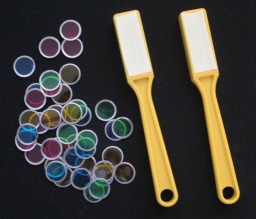- Home
- Teaching Strategies
- Schedules of Reinforcement
Schedules of Reinforcement: Changing Behavior Using Rewards
 Chipper chips are fun reinforcers for kids.
Chipper chips are fun reinforcers for kids.Schedules of reinforcement, special systems of rewarding behavior, can help make your goals for good behavior for your child a reality. I’ll show you how this process can work.
For example, suppose you want your children to learn to take their shoes off when they come into the house.
Most of the time, you may be able to get kids to do this just by telling them each time and hoping they'll establish a habit. And it often works well this way.
But there may be times that it's hard for them to form the habit to do what you want them to do. Some of our kids need a bit of extra help.
Schedules of reinforcement or operant conditioning can provide this help.
With this approach, you're rewarding your child according to a schedule and then fading out the rewards.
Continuous Schedule
With continuous reinforcement you are rewarding them every time they do what you want them to do.
Let’s go back to our example of the shoes.
The first step to take is to instruct them to take their shoes off. If they do this, you would give them a small reward along with lots of praise.
You may have to keep telling them to take their shoes off, and fade this verbal prompt as soon as you can. But each time they take them off, you give them a reward.
Once they are successfully doing this task with rewards, it’s time to start getting them less dependent on reinforcers.
But if you discontinue the rewards at this point, they might stop this good behavior altogether. You don’t want that to happen.
Instead, you can switch to fixed schedules.

Fixed Schedules
With a fixed schedule of reinforcement you are now rewarding them every fixed number of times that they take their shoes off at the door. And you decide whether it will be every two, three or four times.
Once you see that they are successfully performing the behavior on a fixed schedule, you will want to switch to a variable schedule of reinforcement.
Variable Schedules of Reinforcement
On this schedule you’ll vary the number of times they have to take their shoes off before they get a reward. This is an important step in this process because it’s very difficult to unlearn a behavior on a variable schedule.
Gambling is a good example of a behavior that’s difficult to extinguish or erase because it’s reinforced on a variable schedule. Gamblers can see that once in a while someone wins big. So they never know if they’ll be the next winner. They also may win a bit of money once in a while.
In a similar way, a learner on a variable schedule never knows when their behavior will earn the reward. So they keep trying, thinking this time they may get the reward.
Once they are used to getting a reward only once in a while, the next step would be to fade out the rewards. Check out this article to learn how to fade rewards.
Praise Them for Their Efforts

Whether or not you need to use schedules of reinforcement, I highly recommend giving your child lots of praise for their efforts when they have done a great job. Praise gives them a boost of confidence, and it lets them know exactly what they have done well and why they are being rewarded.
The Goal: Keep Them Encouraged
Important: We should give praise or positive feedback, even if all answers or efforts are incorrect, at least until the new skill has been mastered.
Why should we offer praise, even when all answers are wrong?
Our kids have experienced a lot of failure. They need to know that we appreciate their efforts, even if they haven’t yet mastered the skill. Giving them encouragement, even when they fail, can give them the motivation to keep trying.
Once they have mastered the skill, you can choose to offer praise only for correct answers.
Offering praise even for failed attempts is absolutely essential for our children’s success, because we don’t want them to be discouraged or give up.
And they need to know we love and appreciate them, regardless of their performance.
I also recommend fading from other rewards to praise only. Then you can fade out most of the praise as you see fit.
You may also choose to do as I do and skip the fixed schedule entirely. It depends on what your child needs. But I usually progress from a continuous schedule to a variable schedule with no problem.
Remember that you may not need schedules of reinforcement to teach every skill to your child, but they can be very effective when they need more than simple reminders.
Please see my page on rewards for more information on choosing effective reinforcers.



New! Comments
Have your say about what you just read! Leave me a comment in the box below.